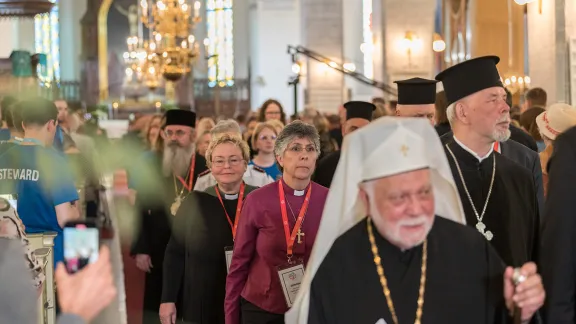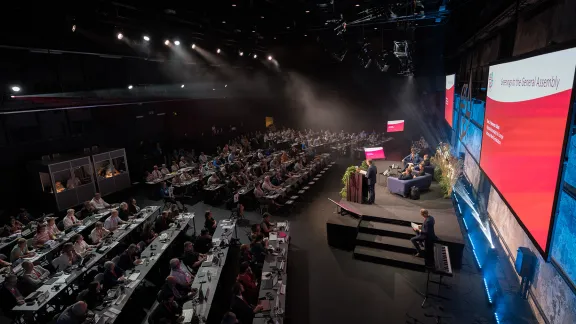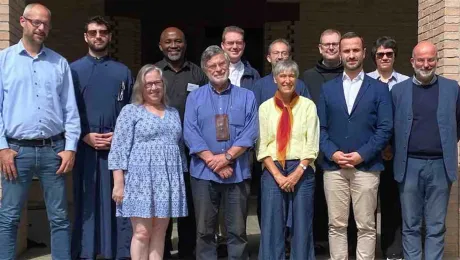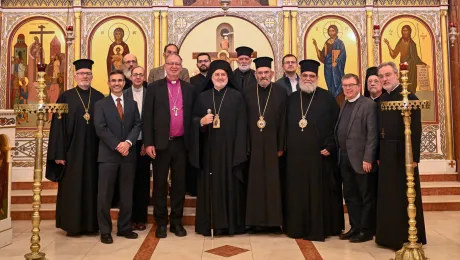Delegates from Lutheran churches across Europe were among those gathered at the Conference of European Churches (CEC) General Assembly in Tallinn, Estonia. Under the theme “Under God’s blessing – Shaping the future”, participants from 113 churches in 40 countries in Europe discussed common challenges in the ecumenical European context.

CEC opening worship at the Saint John's Church (Jaani Kirik) in central Tallinn, Estonia. The 2023 CEC General Assembly takes place on 14-20 June under the theme of: 'Under God's blessing â shaping the future'. Photo: Albin Hillert/CEC
Conference of European Churches connects Lutherans with ecumenical family
(LWI) - One denomination in very different contexts: Delegates from Lutheran churches across Europe were among those gathered at the Conference of European Churches (CEC) General Assembly in Tallinn, Estonia. Under the theme “Under God’s blessing – Shaping the future,” representatives from 113 churches in Europe discussed common challenges in the ecumenical European context.
Keynote speakers outlined the theme from a political, sociological, ecumenical and theological context. While Sviatlana Tsikhanouskaya, leader of the democratic movement in Belarus, highlighted the prophetic voice of the churches in standing up for justice, church leaders from Ukraine also talked about the challenge to proclaim the gospel in the middle of a war, and in secularized society.
German sociologist Hartmut Rosa shared his thoughts of how churches could provide spaces and frameworks to counter the European narrative of permanent growth, leading to aggression and mental health problems. His All-Holiness Ecumenical Patriarch Bartholomew asked challenging questions about the future of ecumenism in Europe.
Public advocacy a Lutheran trait
“It’s very important for us to be here”, said Pekka Huokuna, Director General of the Evangelical Lutheran Church in Finland (ELCF). The ecumenical network is particularly interesting for advocacy with European institutions, added Rev. Dr Elina Hellqvist from the ELCF. “This is a good platform to exchange on how to be active in European institutions.” The Finnish delegates also appreciated the Estonian host churches and their experience in witnessing as minority churches in a secularized context. “We can learn from them,” they said.
While CEC is an ecumenical forum, public theology and advocacy are very important in the Lutheran tradition, said Lea Schlenker from the Evangelical Church in Württemberg. “For me it is part of my Lutheran identity that Christian life not only takes place within church walls, but also in the middle of the world.” As her church is undergoing change, she takes inspiration from other churches in Europe: “If we consider what role churches can play in a diverse society and with limited financial and human resources, I think we can learn a lot from other churches in Europe.”
Connections instead of competition
One such church is the Evangelical Church of the Augsburg Confession in Slovakia (ECACS). Evangelization and mission to a generation that “un-learned being part of a church” is one of their biggest tasks, said Rev. Eva Guldanová, Secretary for Foreign Relations in ECACS. At the same time, she sees a society in need of not only psychological, but also spiritual support. She appreciated the keynote speeches which “invited us to a different way of being” and to prioritize connections over competition. “As churches, we should address the topic of mental health after the pandemic”, she said.
Stronger connections
“Networking is important. We need to join our voices, that’s the only way to be heard and to survive”, said Rev. Dr Ulrich Rüsen-Weinhold from the United Protestant Church in France. He coordinates a group of churches in romanic language contexts in Southern Europe.
While the war in Ukraine was prominent on the agenda, the churches in Southern Europe continue to be engage with the situation of migrants, asylum seekers, and refugees in the Mediterranean. Many have few resources to meet great needs, advocacy initiatives are only possible with support from bodies like CEC. “In our congregations, the only staff we have is usually the pastor. Church music, working with youth – all that is being done by volunteers,” he emphasized.
“Meetings like the 2023 CEC General Assembly help us keep in mind that our Lutheran family is part of a bigger family,” said Deacon Magnea Sverrisdottir of the Evangelical Lutheran Church of Iceland. “We need to strengthen these ties. It invites us to celebrate the similarities we have while keeping our identity.”

Ireneusz Lukas delivers greetings on behalf of the Lutheran World Federation to the 2023 CEC General Assembly. Photo: Albin Hillert/CEC


